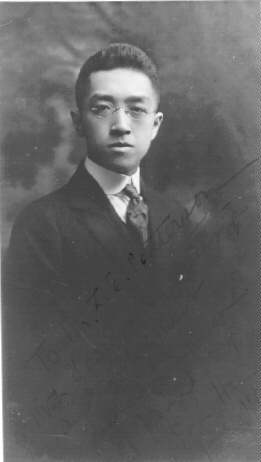Hu Shih
|
|
Hu Shih (Simplified: 胡适, Traditional: 胡適, Pinyin: Hú Shì), (December 17, 1891-February 24, 1962) was a Chinese philosopher and essayist. His courtesy name was Shìzhī (適之).
Born Hu Hóngxīng (洪騂) in Shanghai to Hu Chuan (胡傳, courtesy name Tiehua 鐵花) and Feng Shundi (馮順弟), Hu had an ancestry in Jixi (績溪), Anhui. In January 1904, he was arranged to marry Jiang Dongxiu (江冬秀), an illiterate girl one year older than him with bound feet. The marriage took place in December 1917. He received his fundamental education in Jixi and Shanghai.
Being one of the national scholars, on August 16, 1910, Hu was sent to study at Cornell University in the United States and later Columbia University. He was greatly influenced by his professor, John Dewey, and became a lifelong advocate of pragmatic evolutionary change. He received his Ph.D in philosophy in 1917 and returned to lecture in Peking University. During his tenure there, he began to write for New Youth journal, quickly gaining much attention and influence. Hu soon became one of the leading and influential intellectuals during the May Fourth Movement and later the New Culture Movement. He quit New Youth in the 1920s and published several political newspapers and journals with his friends. His most important contribution was promotion of vernacular literature (Baihua) to replace classic literature (see Classical Chinese).
He was ambassador from the Republic of China to the United States of America (1938-1942), chancellor of Peking University (1946-1948), and later 1958 president of the Academia Sinica in Taiwan, where he remained until his death by heart attack in Nangang at the age of 71. He was chief executive of the Free China Journal, which was eventually shut down for criticizing Chiang Kai-shek.
References
- Hu Shih, Living Philosophies
- Li Ao's Biography of Hu Shih
Resources
- "The Chinese Renaissance" (http://polycrit.com/HuShih): a series of lectures Hu Shih delivered at the University of Chicago in the summer of 1933.

